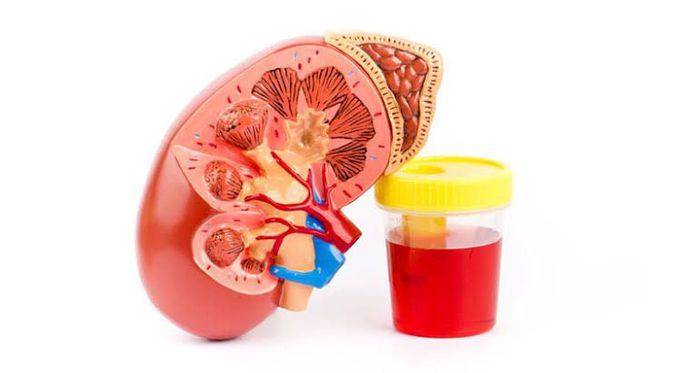


Causes of hematuria
This condition happens when the kidneys or other parts of the urinary tract let blood cells leak into urine. Different problems can cause this leaking to happen, including: Urinary tract infections (UTIs). These happen when bacteria get into the tube through which urine leaves the body, called the urethra. Then the bacteria multiply in the bladder. UTIs can cause bleeding that makes urine look red, pink or brown. With a UTI, you also may have a strong urge to pee that lasts a long time. You may have pain and burning while peeing. Your urine may have a very strong smell too. Kidney infection. This type of UTI also is called pyelonephritis. Kidney infections can happen when bacteria enter the kidneys from the bloodstream. Infections also can happen when bacteria move to the kidneys from a pair of tubes that connect the kidneys with the bladder, called the ureters. Kidney infections can cause the same urine-related symptoms that other UTIs can. But they're more likely to cause a fever and pain in the back, side or groin. A bladder or kidney stone. The minerals in urine can form crystals on the walls of the kidneys or bladder. Over time, the crystals can become small, hard stones. The stones are often painless. But they can hurt a lot if they cause a blockage or leave the body through urine. Bladder or kidney stones can cause blood in urine that can be seen with the naked eye as well as bleeding that can be seen only in the lab. Enlarged prostate. The prostate gland is just below the bladder, and it surrounds the top part of the urethra. It often gets bigger toward middle age. It then puts pressure on the urethra, partly blocking the flow of urine. With an enlarged prostate, you might have trouble peeing, an urgent or lasting need to pee, or blood in the urine. Infection of the prostate, called prostatitis, can cause the same symptoms. Kidney disease. Blood in urine that can be seen only in the lab is a common symptom of a kidney disease called glomerulonephritis. With this disease, the tiny filters in the kidneys that remove waste from blood become inflamed. Glomerulonephritis may be part of a condition that affects the whole body, such as diabetes. Or it can happen on its own. Cancer. Blood in urine that can be seen with the naked eye may be a sign of advanced kidney, bladder or prostate cancer. These cancers might not cause symptoms sooner, when treatments could work better. Inherited illnesses. A genetic condition that affects red blood cells, called sickle cell anemia, can cause blood in urine. The blood cells could be visible or too tiny to see. A condition that damages tiny blood vessels in the kidneys, called Alport syndrome, also can cause blood in the urine. Kidney injury. A blow or other injury to the kidneys from an accident or contact sports can cause blood to show up in urine. Medicines. The anti-cancer drug cyclophosphamide (Cytoxan) and the antibiotic penicillin are linked to blood in urine. Medicines that prevent blood clots also are tied to blood in urine. These include medicines that keep blood cells called platelets from sticking together, such as the pain reliever aspirin. Medicines that thin the blood, such as heparin, also may be a cause. Hard exercise. Blood in the urine can happen after playing contact sports, such as football. It may be linked to bladder damage caused by getting hit. Blood in urine also can happen with long-distance sports, such as marathon running, but it's less clear why. It may be linked to bladder damage or other reasons that don't involve an injury. When hard exercise causes blood in urine, it may go away on its own within a week. If you see blood in your urine after exercise, don't assume it's from exercising. See your health care provider

